Baseball 4
On the desertion of César Prieto
On the desertion of César Prieto
by Roberto M. Yepe
May 27, 2021
Translated and edited by Walter Lippmann for CubaNews.
No one should be surprised that a baseball player dreams of playing and succeeding in the Major Leagues, just as any soccer player can dream of playing in the leagues of England, Spain, Germany or Italy. It is a perfectly natural and irreproachable aspiration.
The U.S. government’s policy against the people of Cuba makes it impossible for a Cuban baseball player to try to fulfill that dream in the same way that a player from any other country could, by means of legal and contractual mechanisms that allow each party involved (athletes and sports federations of the countries involved) to protect their legitimate interests.
For decades, this situation has allowed athlete traffickers and the Major Leagues to benefit from numerous Cuban athletes, trained for years in their country of origin, without having to make the corresponding consideration, compensation or economic indemnification to the Cuban Baseball Federation.
In the face of such flagrant theft of sports talent, it should be expected that the National Institute of Sports, Physical Education and Recreation (INDER) is keeping a detailed historical inventory in all sports disciplines, with the corresponding updated economic valuation of the compensations due to the Cuban sports federations, which could be very useful the day the U.S. government decides to return to a civilized dialogue with its Cuban counterpart.
On the other hand, while the desire of a baseball player to play in the Major Leagues is irreproachable, the decision of an athlete to abandon a team while taking advantage of an international commitment, leaving his teammates in a compromising situation and disappointing an entire people who are waiting for the results of their national team, is totally reprehensible from an ethical point of view.
However, in this commentary I would like to emphasize the economic dimension of the issue. Sports activity in Cuba is ultimately financed by each of the Cuban citizens who, directly or indirectly, contribute economically to the State. Therefore, Cuban citizens have every right to demand and receive the consideration corresponding to the financing of sports activity in Cuba, which is none other than the duty of athletes to represent local teams and national teams with dedication, professionalism and dignity.
For his preparation in the national baseball team and to be able to get to Florida, César Prieto was totally financed by Cuban citizens, in order to cover his salary, food, lodging, transportation, medical attention, visa procedures, plane ticket, among other possible expenses. Given their decision to defect, one might wonder who will compensate the Cuban citizens for the economic damage caused. In Cuba’s current situation (pandemic, intensified economic blockade, generalized shortages and deep economic crisis), it should be kept in mind that the expenses destined to the preparation of Cuban athletes must necessarily be subtracted from the resources available for the medical care of the sick and convalescents of the Covid-19, the feeding of Cuban children and the care of our elderly, just to mention three examples.
I do not feel the slightest personal animosity against Cesar Prieto, not even now that he has decided to carry the heavy stigma of desertion for the rest of his life. I have long admired his extraordinary athletic talent and, in fact, have been hoping for a couple of years now that he would find a way to make his way to the Major Leagues.
I only wish he had done so with dignity and courage, freeing himself of his commitments to the Cuban Baseball Federation beforehand. However, I understand that in this day and age, perhaps that is too much to ask and that, ultimately, his defection is just one of the many systemic effects of the criminal policy of the U.S. government against the Cuban people.
The permanence and the intensification of such policy raise the need for the Cuban State, taking advantage of the current process of legal reforms, to establish more effective and sophisticated contractual and legal mechanisms to protect the economic rights of citizens against the damages caused by sports defections. If we multiply the case of César Prieto by all the desertions that have historically occurred in national teams in all sports disciplines, we could see the considerable economic damage caused to the Cuban people by the theft of sports talent.
Although I am not an expert in the matter, I wonder if the properties of all kinds that the sports deserters might have left in Cuba could not be seized, confiscated or used in some way to compensate for the economic damage caused to the Cuban people. On the other hand, the corresponding administrative and legal mechanisms should be established so that the sports deserters, if one day they decide to visit or return to the country, would have to assume the corresponding civil liability and compensate the people for the economic damages caused.
Obviously, the application of mechanisms of this nature should not be limited to sports deserters, but should be extended to all professional fields.
https://arboledayepe.blogspot.com/2021/05/a-proposito-de-la-desercion-de-cesar.html
Cuba at the Baseball Pre-Olympics

Cuba at the Baseball Pre-Olympics: Frustration, Hysteria and Hatred, Three Strikes that Strike Out Attacks on Cuba
Today begins the pre-Olympic baseball tournament of the Americas, in which the Cuban team, starting at 1:00 p.m., will face its Venezuelan counterpart in West Palm Beach, Florida. However, a group that is not even remotely a majority, intends to continue playing and, of course, losing, the war. To do so, they resort to violence and, logically, to lies. The target of their attacks are the Cuban baseball players.
Translated and edited by Walter Lippmann for CubaNews.
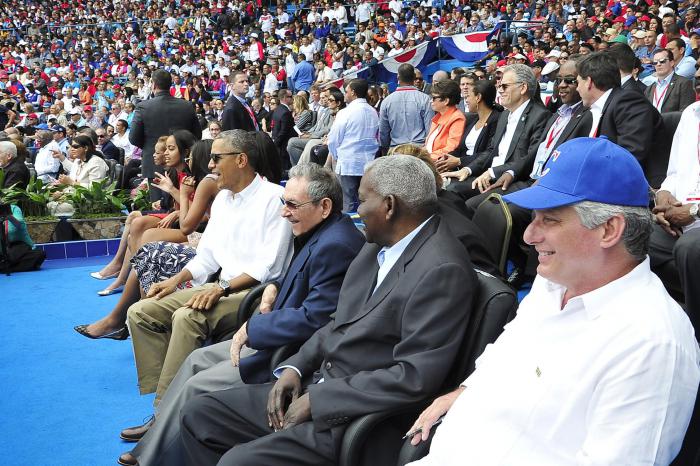
Today begins the pre-Olympic baseball tournament of the Americas, in which the Cuban team, starting at 1:00 p.m., will face its Venezuelan counterpart in West Palm Beach, Florida. However, a group that is not even remotely a majority, intends to continue playing and, of course, losing, the war. To do so, they resort to violence and, logically, to lies. The target of their attacks are the Cuban baseball players.
Protected, organized and directed by Senators Rick Scott and Marco Rubio, Congresswoman Maria Elvira Salazar, and summoned by the cheap spokesman of that leadership, Alexander Otaola, the members of that segment have organized to meet at the baseball park. There, according to Otaola himself, they will protest against the presence of representatives of the “totalitarian” government of the island. In order to guarantee their presence, the legislator even allocated resources for the purchase of tickets.
It was reported that the security of the stadium, whose responsibility falls on Scott himself, would allow the pronouncement by means of offensive posters and the throwing of objects on the field against the players. Even the attack phrases, which out of respect will not be published in the pages of this newspaper, contain obscene words. As if that were not enough, they also announced that they would attack the bus on which the athletes were being transported.
The rules of the Olympic Charter, and this is a tournament under the Olympic umbrella, since it is about the qualifying for the next Games in Tokyo, obliges the hosts to guarantee the normal development of the competition. This includes the safety of each of the participants. In other words, the U.S. authorities, both sporting and governmental, are responsible for what happens to any player.
It is not new to proceed in U.S. territory for our sports embassies. Today it is the frustrated Otaola and his bosses, losers as always, in the face of the virility of the Cuban people and their overwhelming support for the continuity of the Revolution and its successes. These are despite the blockade, more than 240 measures of an alienated president, which the current president has not even touched, and the pandemic. “Poor little ones”, how they have yet to suffer.
Next June 10 will be the 55th anniversary of the Declaration of Cerro Pelado, the name of the ship that carried the athletes to the Central American and Caribbean Games in San Juan, in colonized Puerto Rico. That text expressed the willingness of the delegation to participate, even if they had to swim there. Before, in Jamaica-1962, in a similar event, also in a baseball stadium, Sabina Park, provocateurs like those of today threw chairs and sticks against the members of the delegation, who defended themselves, causing their aggressors to flee. In 1963, in the Pan American Games in Sao Paulo, the plane carrying the athletes was not allowed to touch the airport runway, and the then-president of Inder, José Llanusa Gobels, told the pilot who landed that “we came to compete, it is our right”.
In Indianapolis-1987, the Pan American event found the same hostile environment in several of the scenarios, as in 1999, in Winnipeg, where they even authorized a newspaper, plus a radio station, to whip and incite the desertion of our delegation.
In contrast, never has a U.S. athlete, a member of their delegations or a journalist been assaulted in Cuba, neither physically nor morally. None has been insulted. In March 1999, the Baltimore Orioles baseball team was here, and its players, such as Charles Johnson, known by the fans for his presence in the 1991 Pan American Games, when he hit a decisive home run, was applauded. We gave an earlier ovation to Jim Abbott, that excellent pitcher who was missing a hand, which was not an impediment to his exceptionally. The same applied to his teammates Robin Ventura, Joe Carter or Greg Olson.
It was precisely, in the multisport meeting of America, in 1991, at the dawn of the special period, that Cuba offered US TV to broadcast the Games free of charge.
In Havana, in March 2016, the president of the United States himself attended, in a full stadium, the match between Tampa Bay and Cuba. He was received with utmost respect for his country’s anthem, its flag and his high investiture. There is not a single outrage or slander from the sports press to U.S. athletes. US Baseball players have been received in the bilateral tops and, later, these same people have admired their results in the major leagues, as in the recent cases of Maikel Conforto or Carlos Rodon, the latter author of a zero hit zero runs in this major league season, which was praised by the national sports chronicle.
It has never occurred to anyone that, because of political or ideological differences or because of a criminal blockade, ordered to starve, the work of the governments of the United States, that a baseball player should be booed or mistreated. The same for its President, who sat, with his family, behind home plate at the Latinoamericano sports stadium, a place where the daughter of the legendary Jackie Robinson, received, on behalf of her father, the prolonged applause of tribute to the first Black player in MLB.
Those who today seek to attack and repudiate the Cuba team in Florida have recognized, as they themselves published in social networks, that the issue is political, and it does not matter that they are athletes, artists, journalists or doctors, that they are not government officials. They, like their bosses, do not act against governmental structures, they act against the people, because that, people, are the ball players, whom Otaola, disrespectfully, called hairy rats.
By the way, the players who are looking for their Olympic ticket are clear that their mission there is to play baseball and give a good show to the crowd and to many of their followers who will go to support them. They seek they want the victory of their country, like those who this weekend spoke out against the blockade in several U.S. cities.
For the haters, even if they do not understand a thing, we leave them two messages in the voices of Martin Luther King, Jr., pastor of the Baptist Church, and José Martí. The Cuban-born Martí said: “Nothing a man does debases him more than to allow himself to stoop so low as to hate someone”. And the most universal of Cubans portrayed them: “The barbarians who entrust everything to force and violence, build nothing, because their seeds are of hatred”.
Those who returned

Those who returned
By Nelson Rodríguez Roque
Translated and edited by Walter Lippmann for CubaNews.
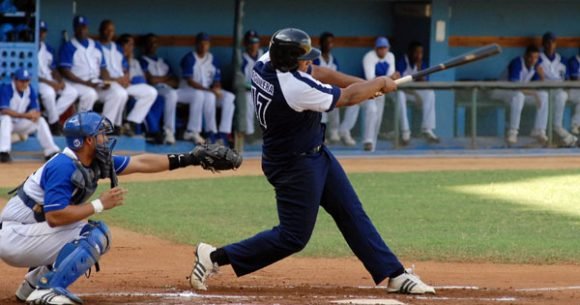
Lerys Aguilera
As of last February 16, it was admitted, through a circular of the Provincial Baseball Commission, the insertion in the 43rd edition of the Holguinera Provincial Series of the baseball players Lerys Aguilera and Yusmel Velázquez, who returned to Cuba before the historic agreement between the U.S. Major Leagues and the ball of the Island.
Those who are trying to sabotage the December 19 pact are deaf to stories like those of these boys, victims of human trafficking, but officially returned to the national sport, as evidenced by the fact that they represent their respective municipalities and are invited to the Holguin Stars Game, to be held on Dec. 31 at the Feliú Leyva Stadium in the City of Parks.
– “It’s inhumane what happens to you.”
An extreme situation is traumatic for any human being. That’s when the fibers of what’s made have to come out. This was experienced by Lerys Aguilera, when he decided to leave his country in April 2014 and try on another baseball. Before he emigrated, he was a consolidated figure in our National Series.
Born in Levisa (1985), Mayarí, province of Holguín, “El Búfalo”, at the time of his departure, had played 11 seasons on the Island and had 108 home runs and 434 runs-batted-in. Generally, he occupied the fourth wood of the holguinero representative.
– You declared that you did not advise anyone to take that path…
“Really, I said it and I reaffirm it, because it is something inhuman that happens to you, you become a bait, a commodity. You risk your life, in the end you go through moments you can’t even imagine. In good Cuban, they are siren songs, they promise you and say a lot, but not even 80 percent of that is fulfilled. Unfortunately, I had to live that experience. It’s a good thing I’m still here, to be able to tell it.
– You also talked about your journey in the illegal boat trip.
“I wouldn’t do it again at all. I was in danger twice. I have no idea where we’re going. I almost drowned, even knowing how to swim, but I was in a situation in which, due to ignorance, the clothes, the backpack and other things I carried weighed heavily on me. If I don’t grab the boat well, I fall and nobody would wait for me, as the night was a wolf’s mouth. It’s unspeakable.
– What are the conditions of the Cuban baseball players who do not win contracts and live in the Dominican Republic?
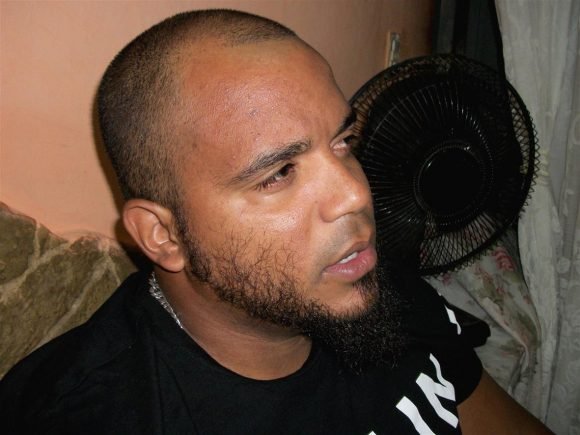
Lerys Aguilera
“It’s an odyssey what they live, we communicate continuously and it’s hard to be like this. When you can’t reach opportunities to play in the U.S. or elsewhere, everything becomes a save yourself. You have to do the unspeakable and work in jobs you’ve never done before, to have an economic income that allows you to survive.
“There are many young people who are in the Dominican Republic ‘eating a cable’, in good Cuban I tell you, having a tremendous job. Without support, without hope. I was able to receive help from many people, even before I left for Nicaragua, but not everyone is so lucky. It has been and continues to be difficult for the Cuban baseball players there.
– Many of them illegal?
“Yes, it’s the safest thing. What happens, most of them do their migratory procedures, stay, in Haiti. But once they cross into the Dominican Republic they become illegal. They are from here to there or they are deported. I managed to get my Dominican identity card, which I first saw as a way of being legal, but then it allowed me to be hired. On October 11, 2017, after coming into contact with the Boer Indians, I left for Nicaragua.
– Do you think that other baseball players can be seen with no apparent way out, like you?
“Of course, it’s desperate. When they cease to have an interest in you, everything becomes more complex. The issue of age can also marginalize you. I spend a lot of time thinking about everything I’ve been through. I had depressions and even tried to attack my life. I suffered from extreme hunger in the Dominican Republic and other very hard moments. I had to train on my own. Thanks to the Lord, those kinds of situations didn’t go to the extreme in me and I didn’t carry out my thoughts.
“What is being done now with legal hiring is a magnificent thing. The baseball players can return to their country without any problem. That’s the way I recommend. Ignore the propositions. The opportunities Cuba opens are the right ones.
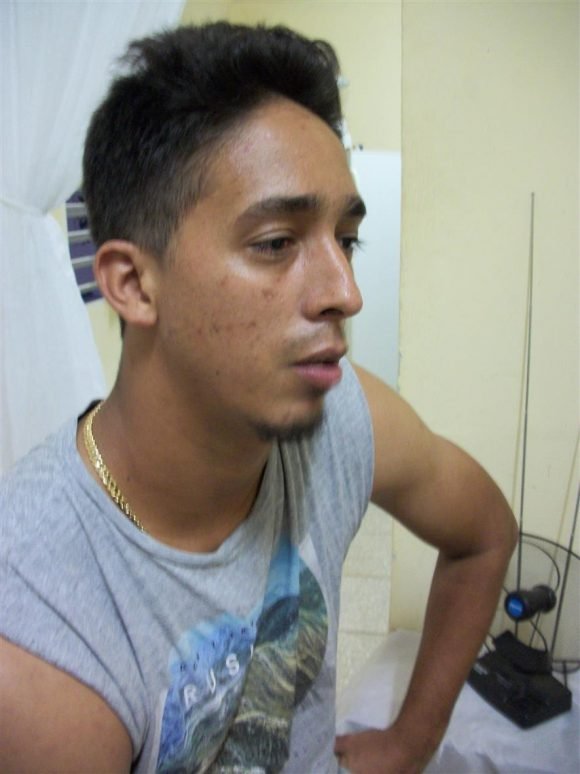
Yusmel Velázquez
– Another Puppy in “return plan”
2015 was a record year in terms of departures of players from the country, legal or illegal. Some, such as colleague Francys Romero, put the number at 150. Among the baseball players who left Cuba was right-handed pitcher Yusmel Velázquez, from Holguín, who had played six National Series, with 34 wins and 35 failures, but at the time was already considered the puppies’ best pitcher.
Velázquez, 27, after entering Haiti three years ago on a risky sea crossing from Maisí (Guantánamo) and staying in the Dominican Republic, returned to his province.
“He had been thinking about returning for months,” he said at home in the City of Parks. The native of the municipality of Urbano Noris is on the island since last November 4, after arriving in the company of his wife and son. But that is present. The future can play a good trick on him.
– Why did you decide to emigrate, just when you were already the pítcher leader of the holguinero staff and perhaps you could have integrated some team Cuba?
“At that moment, I went out in search of better economic conditions. Knowing that I had had good previous years, such as when I made the pre-selection for the Central American and Caribbean Games Veracruz-2014 and, personally, I thought I deserved to be on the team, but I was left out.
“Then, we were told that those of us who had been eliminated were going to the Rotterdam Tournament and then I didn’t make the trip either, without any explanation. Everyone who plays ball in Cuba aspires to become a national team and represent the country. I was a little disappointed that, on so many occasions, I had been pushed aside.
There are still some who think that signing with a U.S. franchise is just a formality. How was your particular case in the Dominican Republic?
“It’s not easy, it’s too big a change. You get to a different baseball, you face difficult training, very different from what you did in Cuba. Sometimes you have to spend several months getting in the right shape, so the Major League teams can see your skills. In the case of pitchers, they have to shoot over 90 mph. I saw very few Cubans who managed to sign.
“There’s still a lot of work going on there, because it’s hard to get hired. I came to be in the form required by the franchises, but for reasons beyond my control, for people who decided for me, I couldn’t be signed. They were three years lost, although at the same time I do not deny that I gained in experience and learning, and perhaps, with the knowledge acquired, I will be able to be a better pitcher in Cuban baseball and help my teammates.
– The “Dominican dream”…
“To the boys who go that way, I say it’s complicated. That it’s an area where you can’t believe in everyone. They, who capture us, promise many things that, in the end, when you are there, are not fulfilled. There’s a lot of ambition for money and you depend on others.
“I was never foreign to the Holguín team, I always followed it on the Internet, I was watching it all the time. Since I returned to Cuba, I didn’t miss a game at the Calixto García Stadium.
A passion for baseball
- English
- Español
A passion for Baseball

By Manuel E. Yepe
http://manuelyepe.wordpress.com/
A CubaNews translation.
Edited by Walter Lippmann.
Over the last few years, groups of baseball history aficionados from the U.S. and Canada have been flying to Cuba to visit historic sites related to this sport and various ballparks to watch Cuba’s provincial teams at play.
Because of the measures implemented by the George W. Bush administration to strengthen the U.S. economic blockade, especially the travel ban imposed on American citizens, these groups are made up exclusively of Canadians, all of them Major League Baseball fans.
While here they meet with some of the country’s great sporting figures who used to play in a number of professional baseball leagues in the U.S. or elsewhere in our continent and whose careers and records are known to them, and share memories and news with the ex-players about others who live here or there or have passed away.
These groups also visit the graves of outstanding Cuban athletes, as well as commemorative plaques and monuments put up either to Cuban ballplayers or Canadian nationals in honor of their achievements in domestic or international matches.
Likewise, they get to greet, always with great admiration and respect, many of the current first-class players of Cuban baseball whose performance in Olympic or Pan American Games, world baseball championships or friendly games with MLB or other professional teams have brought them stardom.
Some of these Canadians even keep up with our National Tournament through the Internet.
Particularly emotional is their usual visit to the cemetery of Cruces, a town in the province of Cienfuegos, where Martín Dihigo (1912-1971) lies buried, and to the Municipal Museum, where there’s a hall dedicated to the famous Cuban player deemed by many the most complete the world has ever seen.
Martín Dihigo filled in every position in the field and is the only one included in four Halls of Fame in three countries: Cuba, Mexico and the U.S. (for his record in both the Big Leagues and the Negro League). He was a fantastic pitcher and a great hitter who set plenty of records, some of which are yet to be broken.
Another significant event is their meeting with Cuban veterans who played in the Majors and gladly share highlights of their life as ballplayers.
I attended one of such meetings where the fantastic African American hitter and Negro League Hall of Famer Monte Irving was present. Now in his eighties, Irving held a friendly argument with the Cuban former MLB pitcher Conrado Marrero, currently a nonagenarian, about a game they played 60 years ago in which the Cuban first struck him out with runners on base and then, in his next at-bat, Irving hit a huge homerun. They both remembered every detail of that game and had a great time exchanging other unforgettable moments of their long-lived friendship on baseball diamonds.
Striking, the way these visitors are delighted at the noncommercial character of Cuban baseball, something they put on a level with the original spirit of the game that North America has lost or is on its way to losing as a result of the growingly suffocating profit-oriented schemes imposed on sports.
If any of them grumbles about a defensive error caused by a flaw of the infield surface or complains that a quality game should not be marred by the use of worn-out balls, there’s always someone who remarks that the authenticity of this sport justifies everything.
It’s incredible to see, when they visit any of the many baseball fans’ discussion circles spread across the country, how well they communicate with the Cubans despite the language barrier, shatter by gestures that all baseball buffs master and use at will, not only in the hurly-burly of a stadium but also in their raucous give-and-take with foreign fans.
Batting averages, ball exit speed ratios, base-running skills, a coach’s strategy and tactics… they’re all described with baseball-like mime and lots of shouting on the side, enough to turn Havana’s Parque Central or any other venue into a genuine, if noisy, friendship forum.
I must point out that some local fans are somewhat distrustful of the visitors, as they don’t rule out the chance that the Canadians might be talent scouts with their eyes on Cuban ballplayers, motivated by political or simply profit-making purposes. They banish all suspicions from their mind, however, as soon as they hear Professor Kit Kriger, a longtime leader of teachers’ labor unions in the city of Vancouver and organizer of these trips, exhort baseball players and fans alike to maintain the purity of the game and keep it beyond the reach of merchants and state with certainty that Cuban baseball outranks American baseball both in terms of competitiveness –as evidenced by the final standings in the 2006 World Baseball Classic– and sportsmanship.
He urged our athletes to devote themselves totally to community sports, turn a deaf ear to siren songs, and always stand by their people, whose support is worth more than any amount of money or consumer goods.
Many of these Canadians interested in the history of baseball have strongly condemned the action taken by the U.S. government to prevent Cuba from being in the abovementioned Classic, as they came within an inch of frustrating one of the most significant events in baseball’s recent history. On the other hand, they highly praised the decision taken by the Cuban government and players to donate any money received at the tournament to the victims of hurricane Katrina, which had destroyed New Orleans only days before, mainly for lack of official involvement. It was Cuba’s attitude what saved the Classic, they assured.
The fact that Cuba finished second –ahead of every other team of the American continent– and even knocked the superpower’s super-team out of the Classic was described by some of them as proof that, far from contributing to the quality of the game, the exorbitant mercantilism ruling over baseball in today’s world detracts from it.
The damage caused by the four-decade-long U.S. blockade on Cuba amounts to more than $80 billion, that is, some $2 billion a year on average. And every year the world votes almost unanimously in the General Assembly of the United Nations against such a flagrant violation of international law.
Something that hardly any U.S. citizen knows is that every time a Cuban player succumbs to a financial offer –made for political reasons rather than for the athlete’s intrinsic qualities– and accepts a contract to play professional baseball in another country, the news travels fast as part as the smear campaign against the Island and its social and political achievements.
How sad that a game otherwise helpful to bring together the peoples of Cuba and the U.S. who love it so much –as shown by these group visits of North American baseball historians– should be used to distort the facts of the Cuban Revolution and encourage defection by promising resources completely alien to the humanism and solidarity values inherent to Cuban sports players.
“Socialism is voluntary”, goes a motto that Cubans proudly voice whenever any high-performance athlete makes such an unfortunate choice and decides to relinquish his or her compatriots’ admiration and affection.
Pasion beisbolera

Por Manuel E. Yepe
Espanol Here
Subscribe to Blog via Email
| M | T | W | T | F | S | S |
|---|---|---|---|---|---|---|
| 1 | 2 | 3 | 4 | 5 | 6 | 7 |
| 8 | 9 | 10 | 11 | 12 | 13 | 14 |
| 15 | 16 | 17 | 18 | 19 | 20 | 21 |
| 22 | 23 | 24 | 25 | 26 | 27 | 28 |
| 29 | 30 | |||||

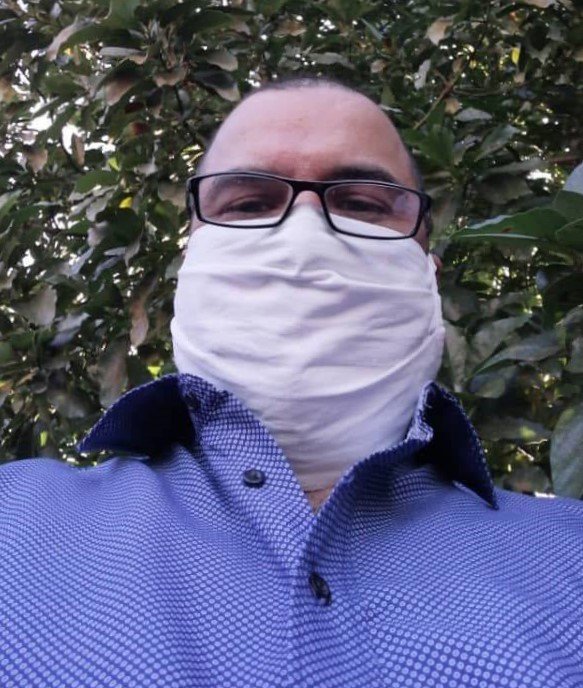

You must be logged in to post a comment.